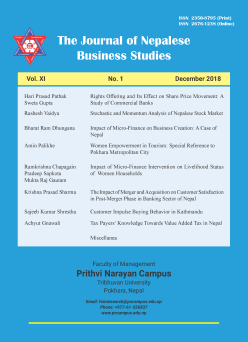Impact of Micro-Finance Intervention on Livelihood Status of Women Households
DOI:
https://doi.org/10.3126/jnbs.v11i1.24200Keywords:
Intervention, livelihood status, micro-finance, non- interventionAbstract
This study attempts to examine the impact of micro finance intervention on the livelihood status of the women households. With the purpose of measuring the impact of micro-finance, 60 non-intervened and the rest 60 intervened respondents having minimum five years attachment with Chhimek Laghubitta Bittiya Sanstha Limited established in the rural area of Pokhara Metropolitan City and nearby VDCs has been selected. Primary data were collected by a semi-structured questionnaire, and both qualitative and quantitative data were used to assess the impact of micro-finance intervention. The study is based on the interventional research design and used randomized control trial approach. Respondents were selected through stratified random sampling. The collected data were analyzed by using parametric (t-test) and non-parametric (Chi-square test) test. The findings of the research show that micro-finance intervention has positive impact on income level, consumption expenses, capital expenditure and savings. The research also shows that micro-finance intervention has positive association with occupational status and micro enterprise creation. One sample t-test on respondent’s rating indicates that micro finance has reached to the remote areas, enhances financial inclusion, facilitates to poverty reduction and ultimately increases the livelihood status of women of rural areas of Pokhara Metropolitan City and nearby VDCs.
Downloads
Downloads
Published
How to Cite
Issue
Section
License
This license allows reusers to distribute, remix, adapt, and build upon the material in any medium or format, so long as attribution is given to the creator. The license allows for commercial use.




